山东省临沂义堂中学中考英语 七下 Units 16复习学案(无答案)
- 格式:doc
- 大小:124.01 KB
- 文档页数:6
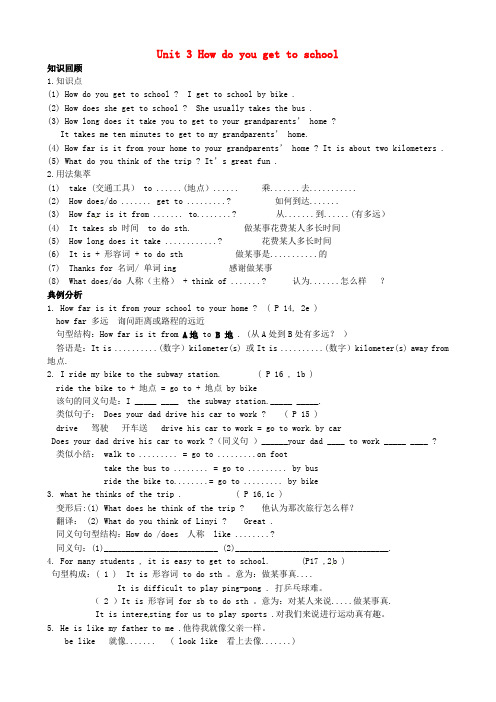
Unit 3 How do you get to school知识回顾1.知识点(1) How do you get to school ? I get to school by bike .(2) How does she get to school ? She usually takes the bus .(3) How long does it take you to get to your grandparents’ home ?It takes me ten minute s to get to my grandparents’ home.(4) How far is it from your home to your grandparents’ home ? It is about two kilometers .(5) What do you think of the trip ? It’s great fun .2.用法集萃(1) take (交通工具) to ......(地点)...... 乘.......去...........(2) How does/do ....... get to .........? 如何到达.......(3) How fa r is it from ....... to........? 从.......到......(有多远)(4) It takes sb 时间 to do sth. 做某事花费某人多长时间(5) How long does it take ............? 花费某人多长时间(6) It is + 形容词 + to do sth 做某事是...........的(7) Thanks for 名词/ 单词ing 感谢做某事(8) What does/do 人称(主格) + think of .......? 认为.......怎么样?典例分析1. How far is it from your school to your home ? ( P 14, 2e )how far 多远询问距离或路程的远近句型结构:How far is it from A地 to B 地 . (从A处到B处有多远?)答语是:It is ..........(数字)kilometer(s) 或It is ..........(数字)kilometer(s) away from 地点.2. I ride my bike to the subway station. ( P 16 , 1b )ride the bike to + 地点 = go to + 地点 by bike该句的同义句是:I _____ ____ the subway station._____ _____.类似句子: Does your dad drive his car to work ? ( P 15 )drive 驾驶开车送 drive his car to work = go to work by carDoes your dad drive his car to work ?(同义句)______your dad ____ to work _____ ____ ?类似小结: walk to ......... = go to .........on foottake the bus to ........ = go to ......... by busride the bike to........= go to ......... by bike3. what he thinks of the trip . ( P 16,1c )变形后:(1) What does he think of the trip ? 他认为那次旅行怎么样?翻译: (2) What do you think of Linyi ? Great .同义句句型结构:How do /does 人称 like ........?同义句:(1)__________________________ (2)___________________________________.4. For many students , it is easy to get to school. (P17 ,2b )句型构成:( 1 ) It is 形容词 to do sth 。
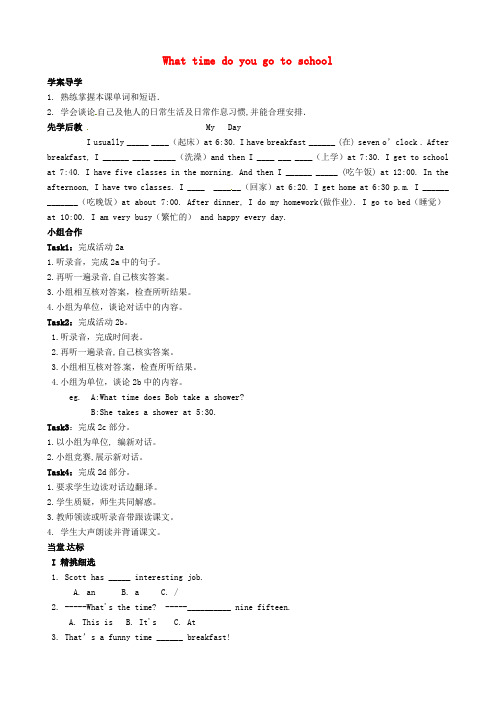
What time do you go to school学案导学1. 熟练掌握本课单词和短语.2. 学会谈论自己及他人的日常生活及日常作息习惯,并能合理安排.先学后教 My DayI usually _____ ____(起床)at 6:30. I have breakfast ______ (在) seven o’clock . After breakfast, I ______ ____ _____(洗澡)and then I ____ ___ ____(上学)at 7:30. I get to school at 7:40. I have five classes in the morning. And then I ______ _____ (吃午饭) at 12:00. In the afternoon, I have two classes. I ____ ______(回家)at 6:20. I get home at 6:30 p.m. I ______ _______(吃晚饭)at about 7:00. After dinner, I do my homework(做作业). I go to bed(睡觉)at 10:00. I am very busy(繁忙的) and happy every day.小组合作Task1:完成活动2a1.听录音,完成2a中的句子。
2.再听一遍录音,自己核实答案。
3.小组相互核对答案,检查所听结果。
4.小组为单位,谈论对话中的内容。
Task2:完成活动2b。
1.听录音,完成时间表。
2.再听一遍录音,自己核实答案。
3.小组相互核对答案,检查所听结果。
4.小组为单位,谈论2b中的内容。
eg. A:What time does Bob take a shower?B:She takes a shower at 5:30.Task3:完成2c部分。
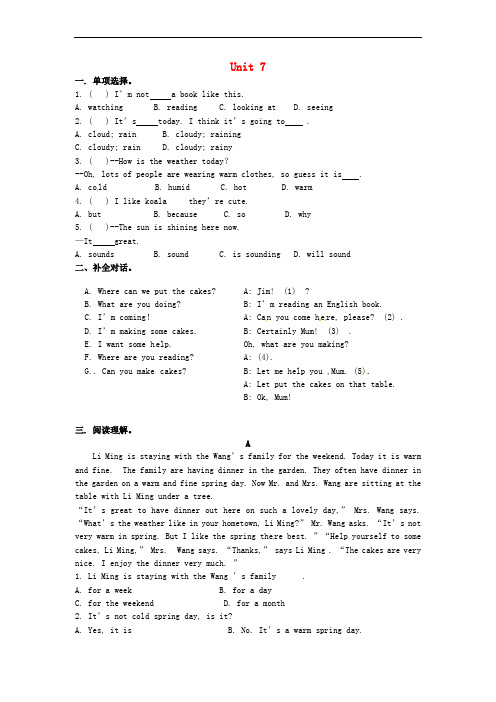
Unit 7一. 单项选择。
1. ( ) I’m not a book like this.A. watchingB. readingC. looking atD. seeing2. ( ) It’s today. I think it’s going to .A. cloud; rainB. cloudy; rainingC. cloudy; rainD. cloudy; rainy3. ( )--How is the weather today ? --Oh, lots of people are wearing warm clothes, so guess it is . A. co ld B. humid C. hot D. warm4. ( ) I like koala they’re cute.A. butB. becauseC. soD. why5. ( )--The sun is shining here now.—It great.A. soundsB. soundC. is soundingD. will sound二、补全对话。
三. 阅读理解。
ALi Ming is staying with the Wang’s family for the weekend. Today it is warm and fine. The family are having dinner in the garden. They often have dinner in the garden on a warm and fine spring day. Now Mr. and Mrs. Wang are sitting at the table with Li Ming under a tree.“It’s great to have dinner out here on such a lovely day,” Mrs. Wang says. “What’s the weather like in your hometown, Li Ming?” Mr. Wang asks. “It’s not very warm in spring. But I like the spring the re best. ”“Help yourself to some cakes, Li Ming,” Mrs. Wang says. “Thanks,” says Li Ming . “The cakes are very nice. I enjoy the dinner very much. ”1. Li Ming is staying with th e Wang ’s family .A. for a weekB. for a dayC. for the weekendD. for a month2. It’s not cold spring day, is it?A. Yes, it isB. No. It’s a warm spring day. A. Where can we put the cakes?B. What are you doing?C. I’m coming!D. I’m making some cakes.E. I want some h elp.F. Where are you reading?G.. Can you make cakes? A: Jim! (1) ? B: I’m reading an English book. A: Ca n you come h e re, please? (2) . B: Certainly Mum! (3) . Oh, what are you making? A: (4). B: Let me help you ,Mum. (5).A: Let put the cakes on that table.B: Ok, Mum!C. No. It’s a warm winter d ayD. Yes. It is a warm spring day.3. The family are having their dinner .A. in the houseB. in the gardenC. in the parkD. in the hotel4. What’s the wea ther like in Li Ming’s hometown?A. It isn’t very cold in springB. It’s very nice .C. It’s not very warm in springD. It’s very cold.BWhen who English people meet, their first words will be “How do you do?” or “How are you?” After the reply “How do you do?” or ”Fine, thank you, and you?” they often talk about the weather. The reason for this is not simply that their weather is interesting and changeable but that the English people don’t like talking about personal matters(私事)with people who are not friends. Talki ng about the weather can be a useful way of starting a conversation with a stranger in public.1. What are the first words when English people meet?A. Say “hello” to each other .B. Say “goodbye” to each other.C. Talk about the weatherD. Talk about their personal matters.2. What’s the answer to “How do you do” ?A. Fine, thank you ,and you?B. How are you?C. How do you do?D. I’m fine, too.3. Why do the English people often talk about the weather?A. Becau se the weather is interesting.B. Because they don’t like talking about personal matters with strangerC. Because the weather is changeable.D. A, Band Care all right.4. From the article, you know that the English people talk about the weather to .A. finish a conversation with a friend .B. start a conversa tion with a stranger.C. Say “goodbye” to a stranger.D. Study the weather.2。
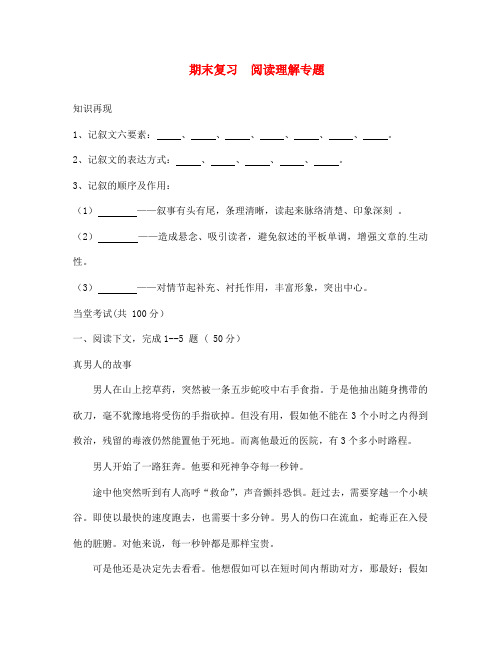
期末复习阅读理解专题知识再现1、记叙文六要素:、、、、、、。
2、记叙文的表达方式:、、、、。
3、记叙的顺序及作用:(1)——叙事有头有尾,条理清晰,读起来脉络清楚、印象深刻。
(2)——造成悬念、吸引读者,避免叙述的平板单调,增强文章的生动性。
(3)——对情节起补充、衬托作用,丰富形象,突出中心。
当堂考试(共 100分)一、阅读下文,完成1--5 题 ( 50分)真男人的故事男人在山上挖草药,突然被一条五步蛇咬中右手食指。
于是他抽出随身携带的砍刀,毫不犹豫地将受伤的手指砍掉。
但没有用,假如他不能在3个小时之内得到救治,残留的毒液仍然能置他于死地。
而离他最近的医院,有3个多小时路程。
男人开始了一路狂奔。
他要和死神争夺每一秒钟。
途中他突然听到有人高呼“救命”,声音颤抖恐惧。
赶过去,需要穿越一个小峡谷。
即使以最快的速度跑去,也需要十多分钟。
男人的伤口在流血,蛇毒正在入侵他的脏腑。
对他来说,每一秒钟都是那样宝贵。
可是他还是决定先去看看。
他想假如可以在短时间内帮助对方,那最好;假如对方的处境麻烦,那么,他就告诉对方自己被五步蛇咬伤,需要在极短时间内得到治疗。
他可以在抵达医院后,再找人前来援救。
可是当他到达出事地点后,才发现问题的严重性。
原来需要帮助的是一对夫妻,他们在山上迷了路,稀里糊涂地走到一个四周都是绝壁的断崖上。
那是一块突起的相对平坦的岩石,往下,是万丈深渊。
往上,是两米多高的崖壁。
他们等于被困在半空。
已经被困几个小时,继续下去的话,后果不敢想象。
拉他们二人上来,即便在平常,也是一件非常困难的事,何况男人已经受伤。
男人思考了几秒钟后,毅然做出一个决定:先救人!他用左手抓住岩石的缝隙,将身体挂在峭壁上,再用受伤的右手抓住女人,在下面的男人的帮助下,艰难地拉她上来。
然后他休息了一会儿,再次探下身子,试图把那个男人也拉上来。
可是那男人的体重让他根本吃不消。
剧烈的运动加速了蛇毒侵入身体的速度,他感觉天旋地转,几乎支撑不住。
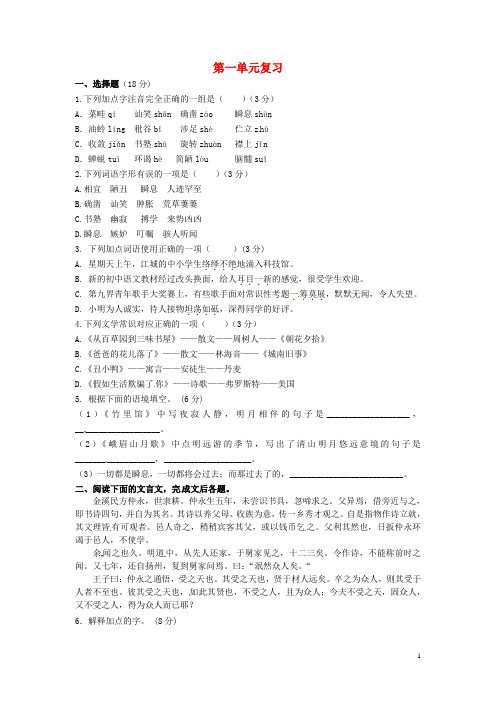
第一单元复习一、选择题(18分)1.下列加点字注音完全正确的一组是()(3分)A.菜畦qí讪笑shān 确凿záo 瞬息shùnB.油蛉líng 秕谷bǐ涉足shè伫立z hùC.收敛jiǎn 书塾shú旋转zhuàn 襟上jīnD.蝉蜕tuì环谒hè简陋lòu 脑髓suǐ2.下列词语字形有误的一项是()(3分)A.相宜陋丑瞬息人迹罕至B.确凿讪笑肿胀荒草萋萋C.书塾幽寂搏学来势凶凶D.瞬息嫉妒叮嘱骇人听闻3. 下列加点词语使用正确的一项()(3分)A. 星期天上午,江城的中小学生络绎不绝....地涌入科技馆。
B. 新的初中语文教材经过改头换面,给人耳目一新....的感觉,很受学生欢迎。
C. 第九界青年歌手大奖赛上,有些歌手面对常识性考题一.筹莫展...,默默无闻,令人失望。
D. 小明为人诚实,待人接物坦荡如砥....,深得同学的好评。
4.下列文学常识对应正确的一项()(3分)A.《从百草园到三味书屋》——散文——周树人——《朝花夕拾》B.《爸爸的花儿落了》——散文——林海音——《城南旧事》C.《丑小鸭》——寓言——安徒生——丹麦D.《假如生活欺骗了你》——诗歌——弗罗斯特——美国5. 根据下面的语境填空。
(6分)(1)《竹里馆》中写夜寂人静,明月相伴的句子是___________________,___________________。
(2)《峨眉山月歌》中点明远游的季节,写出了清山明月悠远意境的句子是__________________,____________________。
(3)一切都是瞬息,一切都将会过去;而那过去了的,__________________________。
二、阅读下面的文言文,完成文后各题。
金溪民方仲永,世隶耕。
仲永生五年,未尝识书具,忽啼求之。
父异焉,借旁近与之,即书诗四句,并自为其名。
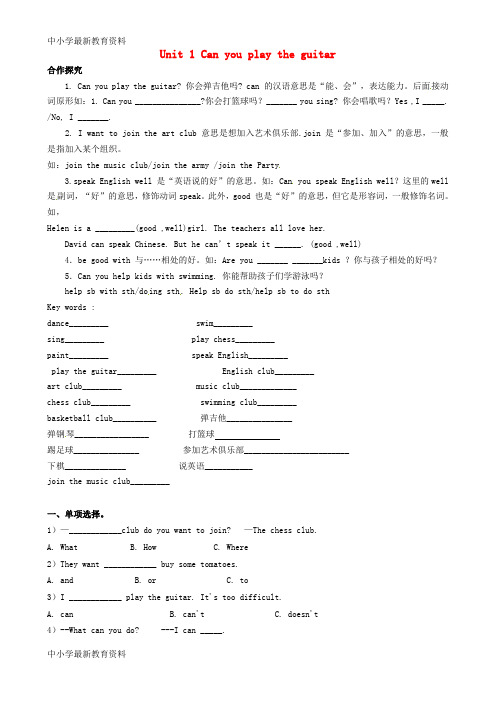
Unit 1 Can you play the guitar合作探究1. Can you play the guitar? 你会弹吉他吗? can 的汉语意思是“能、会”,表达能力。
后面接动词原形如:1. Can you _______________?你会打篮球吗?_______ you sing? 你会唱歌吗?Yes ,I _____. /No, I _______.2. I want to join the art club 意思是想加入艺术俱乐部.join 是“参加、加入”的意思,一般是指加入某个组织。
如:join the music club/join the army /join the Party3.speak English well 是“英语说的好”的意思。
如:Can you speak English well?这里的well 是副词,“好”的意思,修饰动词speak。
此外,good 也是“好”的意思,但它是形容词,一般修饰名词。
如,Helen is a _________(good ,well)girl. The teachers all love her.David can speak Chinese. But he can’t speak it ______. (good ,well)4.be good with 与……相处的好。
如:Are you _______ _______kids ?你与孩子相处的好吗?5.Can you help kids with swimming. 你能帮助孩子们学游泳吗?help sb with sth/do ing sth. Help sb do sth/help sb to do sthKey words :dance_________ swim_________sing_________ play chess_________paint_________ speak English_________play the guitar_________ English club_________art club_________ music club_____________chess club_________ swimming club_________basketball club__________ 弹吉他_______________弹钢琴_________________ 打篮球踢足球_______________ 参加艺术俱乐部________________________下棋______________ 说英语___________join the music club_________一、单项选择。
Unit 7一、学习目标1、描述并谈论天气2、掌握表示天气得词语二、重点难点1 How is the weather ? It’s raining.2 What’s he doing ? He’s pl aying basketball .3 How is it going ? Great / Pretty good / Not good/ Terrible .4 be surprised + 宾语从句+ at sth/sb.+ to do sth.三、知识链接。
现在进行时:表示现在正在进行得动作或存在得状态现在分词的构成① 直接加 ing cleaning② 去e 加 ing writing③ 双写加 ing running④ 变ie 为y 加 ing lie-- lying现在进行时的构成 be + V. ing四. 当堂达标。
1. ( ) --Who is standing under the tree?-- .A.Tom areB. Tom isC. Tom doesD. Tom do2. ( ) --Hi. How’s it going?-- .A.I don’t like itB. I will go to schoolC. Not badD. No3. ( ) It is Sunday today. Look! Alice and Bob in the park.A. is playingB. playingC. playsD. No4. ( ) What do you do when it ?A. snowingB. snowC. is snowyD. is snow5. ( ) Her mother is . She her students now.A. a teacher, teachB. teacher, teachesC. a teacher, teachingD. a teacher, is teaching五. 阅读理解。
6.1-6.2知识回顾1,复习算术平方根,平方根,立方根的概念2,填表区分算术平方根,平方根,立方根的区别 算术平方根 平方根 立方根 表示方法 a 的取值性 质正数0 负数典例分析1、平方根与立方根的概念错解剖析,错在哪,如何改正? (1).36的平方根是6. ( ) (2).41的算术平方根是±21( ) (3).0.01是0.1的平方根 ( ) (4).81的平方根是±9 ( )(5).若x 2=9,则x=3。
( ) (6).16=±4。
( )(7).算术平方根等于本身的数是0。
( ) (8).平方根等于本身的数是1和0。
( ) (9).8的立方根是±2。
( ) (10).立方根等于本身的数是1和0。
( )(11).a 2的算术平方根是a 。
( ) (12).若()52=-a ,则a=-5。
( )2、下列说法正确的是( )A .16的平方根是±4B .-6表示6的算术平方根的相反数C .任何数都有平方根D .-a 2一定没有平方根3、填空 -8是的平方根 64的平方根是 。
64的值是 64的平方根是 64的立方根是4、解下列方程: (1)x 2=196 (2)4 x 2=25 (3)(x-2)2=3 (4)9(3-y)2=4(5)x 3=-8 (6)2x 3=128 (7)(y-3)3=-125 (8)27(32-x )3+125=05、比较大小:(1)263 3 (2)63- -8 (3)4110- 0.5;6、先找规律,再填空(1)已知7201.1=1.311,147.4201.17=; 那么0.001720的平方根是(2)已知36.2=1.536,6.23=4.858; 若x =0.4858,则x 是 (3)已知325.5=1.738,35.52=3.744,则35250的值是7、按计算规律化简下列各式,并解答式子下面的问题2a = = (a )2= 33a =(3a )3=8、已知a<0,求2a +33a 的值9、已知m<n ,求()()32m n n m -+-的值达标检测(1)(-2)2的平方根是 ,算术平方根是 ;(2)16的平方根是 ,算术平方根是。
第三章人体的呼吸(复习)一.知识再现()1.人体的呼吸系统是由和两部分组成的。
呼吸道由、、、和组成。
是气体进出肺的通道,还能使进入肺的气体_______、________、________。
2 ..吃进去的食物和吸入的空气都要经过______,有的人边吃边笑,吞咽时___________来不及盖住喉口,食物进入气管就会引起剧烈的咳嗽。
3.鼻腔前部生有鼻毛,能起____________的作用;鼻腔内表面的__________可以分泌黏液,对空气起_________和__________的作用;粘膜内还分布着丰富的_______________,对吸入的空气具有___________的作用。
可见,用鼻呼吸比用口好。
4. 是呼吸系统的主要器官,它位于腔内。
5.当膈肌收缩时,膈的顶部,胸腔的上下径,表示在进行(呼气还是吸气)。
6.当膈肌舒张时,膈的顶部,胸腔的上下径,表示在进行(呼气还是吸气)。
7.膈肌、肋间肌→胸腔容积→肺容积→肺内气压,于大气压→吸气,当吸气结束时,肺内气压于大气压。
8.膈肌、肋间肌→胸腔容积→肺容积→肺内气压,于大气压→呼气,当呼气结束时,肺内气压于大气压。
9.我们呼出的气体和吸入的空气有明显的不同,呼出的气体中,氧的含量,二氧化碳的含量。
10.肺适于气体交换的特点:肺泡数目;肺泡外面包绕着丰富的;肺泡壁和毛细血管壁都是一层,便于充分进行气体交换。
11.肺泡与血液的气体交换过程:肺泡中的透过肺泡壁和毛细血管壁进入;同时,血液中的也通过毛细血管壁和肺泡壁进入,然后随呼气的过程排出体外。
二.典例分析1.如图是某人在1个标准大气压下的一次平静呼吸中肺内气压的变化曲线图,请据图回答:(1)曲线AB段表示动作时肺内气压的变化。
(2)曲线BC段的变化中,胸廓的前后、左右、上下径都。
(3)本次呼吸中,吸气结束的一瞬间是坐标系中的,此时肺内气压与大气压的值。
(4)在曲线AB、BC段变化中,与呼吸有关的肌肉的变化情况:AB ;BC 。
What time do you go to school知识再现1. What time do you get up? 由疑问词what time(几点)引导的特殊问句。
结构:What time +助动词do/does +主语+动词原形,询问某人做某事的具体时间。
2. I usually get up at five o’clock. 我通常在五点钟起床。
★下面的排列更直观地说明了这几个词的频率的"大小"。
always>usually>often>sometimes>seldom>never3. To get to work, he takes the number17 bus to the Sai Te Hotel.动词take在此时“乘坐”的意思;而by也有“乘坐”的意思,但它是介词。
He often take s the bus to work.= He often go to work by bus.4. People love to listen to him.人们喜欢听他的!love to do sth. 强调具体活动love doing sth. 强调习惯。
5. He gets home at 7:00,and he watches morning TV.get “到达”,接名词时,要加介词to;接副词(here, there, home)时,不加to 6. Can you think what his job is?你能想到他的工作是什么吗?what his job is 表示“他的工作是什么”,其中,what his job作think的宾语。
What she says is very good.她说得很好。
(作主语。
注意,谓语动词要用单数。
)7. What time is it?几点了? -It’s eight thirty.八点三十分。
1 Units1-6 班级 : ______ 姓名: _______ 分数: ________ 一、重点词组、重点句子 1.join the …club=be in the …club, join sb. for sth 2.Can you do…? Yes, I can./No, I can’t. 3.Students Wanted for School Show=We need/want students for the school show. 4.do kung fu 5.Play games with… 6. the old people’s home 7.The students’ sports center 8. be good with…9.on the weekend = on weekends 10get up 11.go to school, 12.get dressed, 13.brush teeth, 14.eat breakfast, 15.take a shower 16.a radio station 17.radio show 18.it’s time to do sth.=it’s time for sth. 19.be late (for sth.)=get to …late=arrive late for… 20.be good for…21.look/ sound/taste + adj.22.be sleepy- go to bed- go to sleep- be in bed- fall asleep- be asleep- have a sound sleep- wake up- be awake- get up 23. always, usually, often, sometimes, never 频度复词用语系动词、情态动词之后,实意动词之前,用How often 提问. 24.lots of = a lot of , a lot = very much 25take the train=by train ,ride a bike = by bike ,walk = on foot 26.live/be + 距离 + (away) from…27.20 minutes’ walk=20-minute walk 27.主 +need +时间+to get to … 28think of=think about,What do you think of …=How do you like… 29.For …, it is +adj. to do…=It is + adj. (for sb.) to do …30.between … and… 31.too + adj. for …,too + adj. to do… 32.go on a ropeway 33.gross = go across 34.be afraid (of sth./ sb./ doing sth.) 35. come true 36.Thanks for sth./ doing sth. =Thank sb. for sth./ doing sth. 37.leave + 地点, leave the dirty dishes in the kitchen 38.stop VS station in the classroom VS in class, in the dining hall, in the hallways, in the music room, 39. fight with sb. 40. eat outside 41.listen to music outside42. wear a hat 43.wear the school uniform 44.be quiet = keep quiet, be noisy, get noisy 45. Must + 主 + do…? Yes, 主+ must./No, 主+ needn’t. 46. Do/Does + 主 + have to do…?Yes, 主+ do/does./ No, 主 + don’t /doesn’t. 47. Don’t do… = No doing… 48. on school nights/ days 49.before/ after + 一餐 50. in the evening/ morning ,at noon/ night,every morning/ afternoon/ evening 51. make the bed = make one’s bed 52.dirty- messy,clean- tidy 53.be strict ( with sb.) 54. remember to do sth,remember doing sth. 55. keep my hair short 56 relax- relaxing- relaxed 57. learn sth./ to do sth. ,learn sth. from sb. 58.really 2
/very/kind of+adj 59. walk on two legs 60. sleep all day 61. a good name for …62.Why don’t you do…=Why not doing…63.What animals do you like best?=What’s your favorite animals? 64.be in (great) danger 65.a / the symbol of 66.be lost = get lost ,lose – loss – lost 67.places with food and water 68.cut down trees 69.kill … for…70.be made of=be made from 71.Isn’t she beautiful? Yes, she is./ No, she isn’t. 72.reading a newspaper 73.talk on the phone 74.use the computer 75.wash the dishes / clothes 76.go to the movies 77. Not much= Nothing much 78. live with … 79.the Dragon Boat Festival 80.miss sb./sth. 81.wish (sb.) to do sth 二、重点语法 1.现在进行时 (1)构成形式:Be动词+动词的ing形式 这里强调一点,两者缺少其中任何一种都不可以构成现在进行时。 (2)现在进行时表示动作正在进行或事情正在发生。 (3)有用的依据:一个句子中既有be动词,又有动词,且动词加了ing ←→ 该句是现在进行时 (4)句中往往有now、look、listen等词。 2.一般现在时 一般现在时表示现在的状态 ;表示经常性或习惯性的动作;表示主语具备的性格和能力等。例如: 1、He is twelve. 他十二岁。2、I go to school at seven every day. 3、They speak Japanese. 一般现在时常和表示时间频度的副词连用。如:often, usually, sometimes, always, never, hardly ever等。1. I often read books in the evening.2. Do they usually go to school by bike.. 一般现在时常和以下时间表达法连用。如:in the morning, in the afternoon, in the evening, at noon, at night, every day, on Sunday(s), at seven 等。 动词第三人称单数的构成:(用于第三人称单数、可数名词的单数和不可数名词的一般现在时中) 1、直接加--s look—looks read—reads play—plays stop—stops 2. 在字母s, x,ch,sh,o后加--es miss—misses fix—fixes watch—watches wash—washes 3
go—goes do--does 3. 辅音字母加y结尾的动词变y为i,再加-es carry–carries study–studies hurry–hurries cry–cries 4.特殊的 have -- has 3. how 引导的特殊疑问句 (1).how 引导的特殊疑问句提问交通方式,其答语分三种情况: a. take a/an/the+交通工具(单数) b. by+交通工具(单数) c. on/in+限定词+交通工具 (2). how far 用来提问距离,多远,其答语分为两种: 用长度单位表示:It is five kilometers.用时间表示:It’s twenty minutes’ walk. (3).how long 用来提问时间,意为多久回答常用“for+段时”。 ----How long have you learnt English? ----For 3 years. (4).how soon 用来提问做完某事还需要多长时间, 常用于将来时态时, 常用“in+时间段”来回答。――How soon will you arrive in Beijing?----In 3 hours.
三、当堂测试 Ⅰ.单项选择。 1.She likes playing______ piano;her brother likes playing__D__ basketball. A.the;a B.a;the C./;the D.the;/ 2.—What do you often do____ ___classes to relax yourselves? —We often do eye exercises,listen to music or do some running around the school. A.in B.among C.between D.through 3.There are some__C__ in Dayton Art Museum.For example,no food or drinks is allowed inside. A.jobs B.records C.rules D.paintings 4.Don't forget____ thanks when other people help you. A.accept B.to accept C.say D.to say 5.—Is New Zealand a big country? —No, New Zealand only has two islands.One is North Island,____ is South Island.